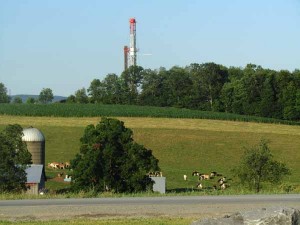How are energy boom states dealing with drilling-related health complaints?
-
Katie Colaneri
Is heavy drilling making some people sick?
It a question doctors, public health researchers and regulators in oil and gas-producing states are still struggling to answer roughly six years into the American shale boom.
So far, one thing is clear: different states approach the issue of public health and drilling in different ways.
StateImpact Pennsylvania teamed up with Inside Energy – a collaboration of public media stations in Colorado, Wyoming and North Dakota – to learn more about how states are dealing with the intersection of drilling and public health. Here’s what we found:
- Three states – including Pennsylvania, Colorado and North Dakota – log complaints in databases.
- Five of the state health departments we contacted said they were not tracking health complaints at all.
- Two states have put large-scale drilling on hold until they complete reviews of the environmental and health impacts of drilling.
Some states not tracking health complaints
“The Ohio Department of Health does not maintain a database nor do we have a monitoring program,” said spokeswoman Melanie Amato in an e-mail. “The Ohio Department of Natural Resources tracks oil and gas complaints, but nothing related to health.”
Similarly, officials in Oklahoma, Texas, Wyoming and West Virginia said their agencies had little or no regulatory role in oil and gas development. All five states referred us to their oil and gas commissions or environmental protection departments.
In West Virginia, health officials in one county have struck out on their own.
The Wheeling-Ohio County Health Department has created an online survey where residents can report potential health impacts such as respiratory problems or sleep disturbance from noise or light.
So far, about 50 people have responded to the survey since it was launched in January, according to county health administrator Howard Gamble.
“We had the community coming to us and the plan to collect data from two major hospitals wasn’t going to work,” said Gamble. “So this was the county’s response to try to collect data.”
The data will eventually be turned over to researchers at West Virginia University’s School of Public Health. The university has received state funding to pursue studies on the impacts of shale gas development.
Public vs. private databases
In Pennsylvania, the state Department of Health’s Bureau of Epidemiology logs complaints related to natural gas development in a database. Spokeswoman Aimee Tysarczyk said the bureau also follows up directly with people who file complaints and conducts investigations.
The state Department of Environmental Protection also fields calls on health concerns.
“The department often advises the complainant to call DOH and consult a physician if the complainant believes there is a health concern related to their environmental issue,” said DEP spokeswoman Morgan Wagner in an email.
The commonwealth’s Department of Health has logged 51 complaints since 2011 – about three years into the Marcellus Shale boom.
However, the agency said the contents of the database include “protected health information” and cannot be shared with the public.
In North Dakota, state regulators have been tracking these complaints for the past six months, but the data is also not readily available to the public.
By contrast, regulators in Colorado log all drilling-related complaints – including health and environmental concerns – in a public online database maintained by the state’s Oil and Gas Conservation Commission (COGCC).
A spokesman said the panel investigates all complaints within 48 hours.
“When people lodge a health complaint, agency staff collects information about the activity the individual believes may be related and then we inspect those operations for any problems or anomalies,” said Todd Hartman.
The database contains information about 1,175 complaints over the last five years.
An Inside Energy analysis of the data found that concerns about groundwater was the most common (about 37 percent) of all drilling-related complaints between 2008 and 2012. The second most common complaint was about noise from nearby gas development operations (about 10 percent).
However, for all the data available about complaints, public health researchers say they are missing baseline information that would help them draw more accurate conclusions about whether drilling is impacting health.
“What was the air quality like before,” Lisa McKenzie, a research associate at the University of Colorado’s School of Public Health told Inside Energy. “What was the water quality like before and what was the health of the population before?”
Drilling on hold in Maryland and New York
Two of Pennsylvania’s neighboring states have cited the lack of data as a reason to put large-scale shale gas drilling on hold.
In New York, Democratic Gov. Andrew Cuomo has directed the state departments of environmental protection and health to review the scientific literature around the impacts of natural gas development. Over the years, the state has missed a series of self-imposed deadlines to finalize these reviews.
In Maryland, the state is funding a specific kind of study known as a “health impact assessment.” It is part of Democratic Gov. Martin O’Malley’s “safe drilling initiative,” which also includes a review of best drilling practices and a study of the potential economic impacts of development.
Dr. Clifford Mitchell with the Maryland’s Department of Health and Mental Hygiene said the assessment will be used to guide policymakers for eventual drilling in the western part of the state.
“What we’ve asked the University [of Maryland] to do is to look at some baseline data for health, to look at what the potential hazards are from the literature, to use any available data resources,” Mitchell said. “The whole goal to look as broadly as possible at potential health impacts.”

















